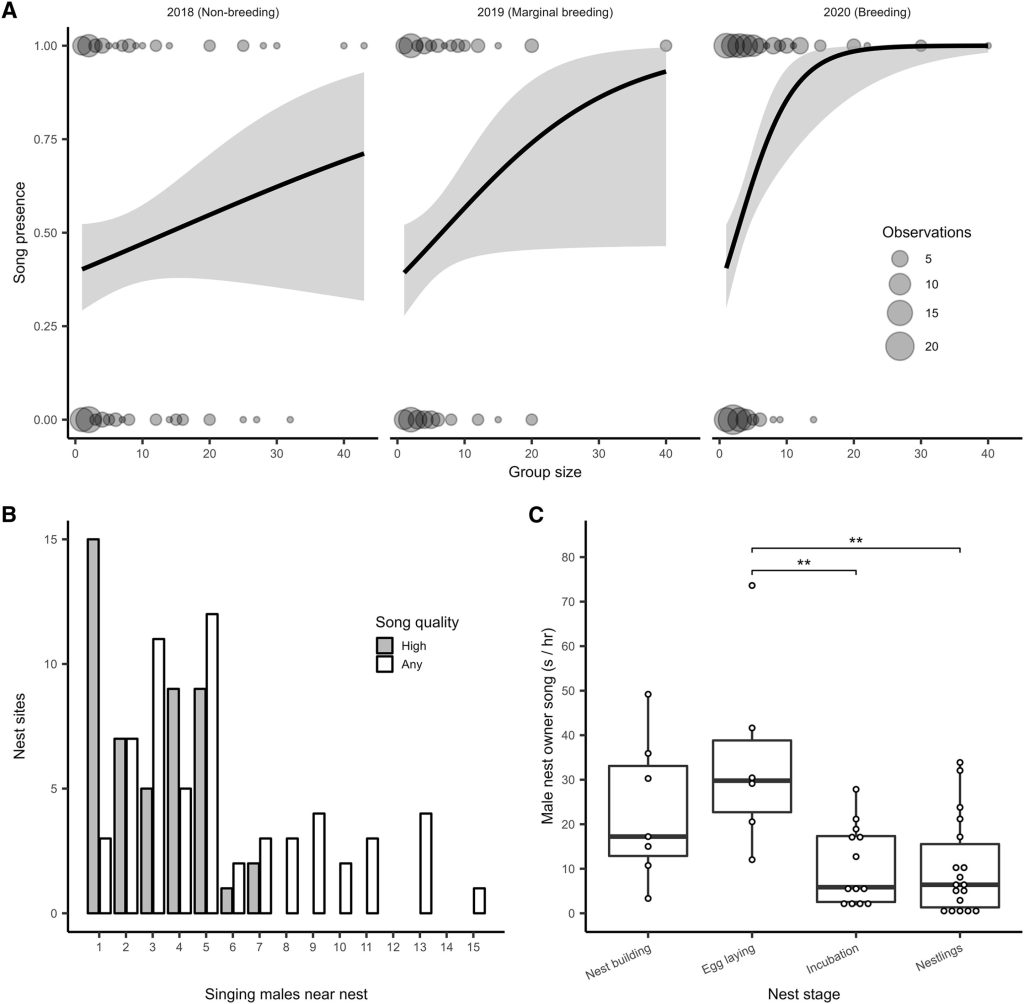Zebra finches sing in group contexts and breeding status influences song at the nest and at these aggregations. (A) Song (present/absent) increased significantly with group size when birds were breeding, but not when there was no or marginal breeding. Shaded areas denote standard errors of the logistic model. (B) Multiple singing males could be heard at the nest. Song quality is a measure of proximity, where high-quality song is uttered by birds near the nest, and “any” quality represents all identifiable song. (C) Nest stage predicted song output of the male nest owners, peaking at egg laying. The dots represent the males. Boxes encompass the first to third quartiles, thick lines are medians and whiskers extend until 1.5 times the inter-quartile range. Credit: Current Biology (2022). DOI: 10.1016/j.cub.2022.11.047
Australian wild zebra finches sing more with others around when breeding conditions are favorable. Their song also changes based on their breeding stage and it attracts other zebra finches. A possible explanation for this behavior is that birds try to influence each other’s breeding behavior by singing, as found in research from Wageningen University & Research published in the journal Current Biology.
This outcome is remarkable, because scientists typically assume that birds sing for two reasons: defending a territory and attracting a mate. “These reasons fit poorly for wild zebra finches,” says scientist Hugo Loning. “Zebra finches are not territorial and often find their partner early in life. Furthermore, partners are very faithful, so cheating is rare.”
Group singing
If these reasons do not fit, the question is why zebra finches sing so much as they do. Loning visited the Australian outback several times to study the birds in their natural environment. “Our measurements show that zebra finches sing in groups,” says Loning, “that is striking already.” On top of that, they sing more in groups when more birds in the population are breeding, and a males’ song changes depending on their breeding stage.
“So, as a zebra finch, you can infer the local breeding conditions just by listening. In that context it makes sense that we also find that birds are attracted to song.”
A possible explanation is that zebra finches, living in an unpredictable environment, use their song to synchronize their breeding activity. Evolutionary speaking, it is a lot safer if everybody reproduces at the same moment, to lower the chance that the chicks get eaten by predators. Also, having peers around is probably beneficial for the social development of the chicks.
The world’s most studied songbird
Although zebra finches are one of the most studied songbirds in the world, almost all that research is conducted on captive birds. This study substantially improves our understanding of zebra finch singing behavior in their natural environment.
“Zebra finches are robust and do well in captivity, which is why they have become an important animal model for research. But ecologically relevant questions such as why they sing have never been answered,” Loning says.
More information: Hugo Loning et al, The social role of song in wild zebra finches, Current Biology (2022). DOI: 10.1016/j.cub.2022.11.047
Provided by Wageningen University
Citation: Zebra finches might sing to synchronize their breeding with each other (2022, December 23) retrieved 16 January 2023 from https://phys.org/news/2022-12-zebra-finches-synchronize.html
This document is subject to copyright. Apart from any fair dealing for the purpose of private study or research, no part may be reproduced without the written permission. The content is provided for information purposes only.

